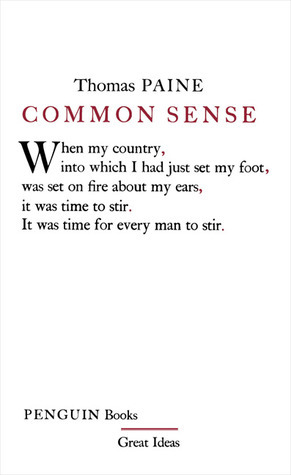About Common Sense
Among the most influential authors and reformers of his age, Thomas Paine (1737–1809) was born in England but went on to play an important role in both the American and French Revolutions. In 1774, he emigrated to America where, for a time, he helped to edit the Pennsylvania Magazine. On January 10, 1776, he published his pamphlet Common Sense, a persuasive argument for the colonies’ political and economic separation from Britain.
Common Sense cites the evils of monarchy, accuses the British government of inflicting economic and social injustices upon the colonies, and points to the absurdity of an island attempting to rule a continent. Credited by George Washington as having changed the minds of many of his countrymen, the document sold over 500,000 copies within a few months.
Today, Common Sense remains a landmark document in the struggle for freedom, distinguished not only by Paine’s ideas but also by its clear and passionate presentation. Designed to ignite public opinion against autocratic rule, the pamphlet offered a careful balance between imagination and judgment, and appropriate language and expression to fit the subject. It immediately found a receptive audience, heartened Washington’s despondent army, and foreshadowed much of the phrasing and substance of the Declaration of Independence.
- Complete Title: Common Sense
- Format: Paperback
- Language: English
- Number of Pages: 104
- Publication Time: September 6, 2005
- Publisher: Penguin
- ISBN: 0143036254
- ISBN13: 9780143036258
About Thomas Paine
 Thomas Paine
Thomas Paine
Thomas Paine was an English-American political activist, author, political theorist and revolutionary. As the author of two highly influential pamphlets at the start of the American Revolution, he inspired the Patriots in 1776 to declare independence from Britain. His ideas reflected Enlightenment-era rhetoric of transnational human rights. He has been called “a corset maker by trade, a journalist by profession, and a propagandist by inclination”.
Born in Thetford, England, in the county of Norfolk, Paine emigrated to the British American colonies in 1774 with the help of Benjamin Franklin, arriving just in time to participate in the American Revolution. His principal contributions were the powerful, widely read pamphlet Common Sense (1776), the all-time best-selling American book that advocated colonial America’s independence from the Kingdom of Great Britain, and The American Crisis (1776–83), a pro-revolutionary pamphlet series. Common Sense was so influential that John Adams said, “Without the pen of the author of Common Sense, the sword of Washington would have been raised in vain.”
Paine lived in France for most of the 1790s, becoming deeply involved in the French Revolution. He wrote the Rights of Man (1791), in part a defence of the French Revolution against its critics. His attacks on British writer Edmund Burke led to a trial and conviction in absentia in 1792 for the crime of seditious libel. In 1792, despite not being able to speak French, he was elected to the French National Convention. The Girondists regarded him as an ally. Consequently, the Montagnards, especially Robespierre, regarded him as an enemy.
In December 1793, he was arrested and imprisoned in Paris, then released in 1794. He became notorious because of his pamphlet The Age of Reason (1793–94), in which he advocated deism, promoted reason and freethinking, and argued against institutionalized religion in general and Christian doctrine in particular. He also wrote the pamphlet Agrarian Justice (1795), discussing the origins of property, and introduced the concept of a guaranteed minimum income. In 1802, he returned to America where he died on June 8, 1809. Only six people attended his funeral as he had been ostracized for his ridicule of Christianity.
Reviews Common Sense
 Kevin
Kevin
“A pamphlet called ‘Commonsense’ makes a great noise. One of the vilest things that ever was published to the world. Full of false representations, lies, calumny, and treason, whose principles a…
 Angela Blount
Angela Blount
“Time makes more converts than reason.” – Thomas Paine And with that early quote, this reader steadily became enthralled with a founding father. I sincerely wish this novella-sized essay had been r…
 Michael O’Brien
Michael O’Brien
One of the most important works from any writer during the American War for Independence. During the darkest days of the struggle, Gen. George Washington reportedly had Paine’s work read to his troops…
 Mia
Mia
12/19/20: This review continues to be a source of great annoyance. Since I can’t mute the comment section, I’ll just put a little message here: don’t comment. I don’t read the comments anymore…
 Sara
Sara
I feel a bit ashamed that this is the first time that I have read Common Sense in its entirety. It is a piece of American history that deserves our attention and respect. It is easy to see why it affe…
 Iris P
Iris P
In observance of Independence Day I decided to read something to help me widen my knowledge on the history of the American Revolution.Common Sense is 48 page pamphlet written by Thomas Paine, but publ…
Helga
“How impious is the title of sacred majesty applied to a worm, who in the midst of his splendor is crumbling into dust!”…
 kezzie ☾ (jude’s version) 🍉
kezzie ☾ (jude’s version) 🍉
✩ 2 stars~[read for high school ‘junior year’ great books class]~“I’ve been reading Common Sense by Thomas Paine, some men say I am intense or I am insane.”~this book is literally just abo…
 Stephen
Stephen
4.5 stars. Scathing, derogatory rhetoric directed at the King of England in particular and the British in general designed to arouse the “passions” of the American colonists to embrace the idea of ind…
